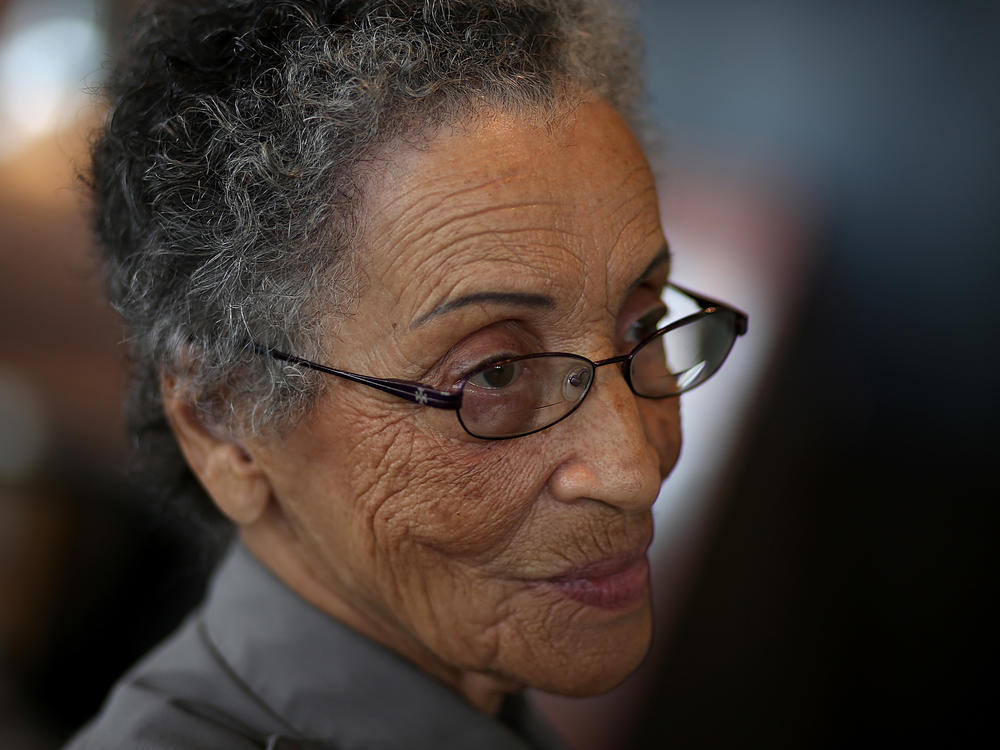Section Branding
Header Content
The oldest park ranger, who told the stories of Black women in WWII, retires at 100
Primary Content
Updated April 1, 2022 at 3:31 PM ET
There's no better way to learn history than from the people who lived it. And for years, Betty Reid Soskin — a.k.a. Ranger Betty — brought her invaluable perspective to work at the National Park Service, sharing experiences that otherwise would have been gone unacknowledged.
"What gets remembered is a function of who's in the room doing the remembering," Soskin, who turned 100 last fall, has said.
For years, Soskin was the oldest active ranger in the park service, leading public programs at the Rosie the Riveter/WWII Home Front National Historical Park in Richmond, Calif. That chapter of her rich life has finally come to a close: She retired on Thursday, capping a career that saw her enrich histories of the World War II home front with her own experience as a woman of color facing segregation and hours of toil.
While Rosie the Riveter was the famous public face of women's industrial work during the war, Soskin literally had to create the space to tell stories like her own.
"That really is a white woman's story," Soskin said of the iconic bandanna-wearing worker, in a 2014 interview with NPR.
Soskin initially helped shape the historical park in Richmond through planning meetings. Then she worked with the park service through a third-party grant highlighting Black Americans' experiences during World War II. Her drive to ensure park visitors understand the broader context of the war effort, and the backdrop of racism and segregation, led to her accepting a temp position at age 84, and then a permanent job.
As a young woman during World War II, Soskin worked as a shipyard clerk for an all-Black auxiliary lodge of the Boilermakers union, which didn't allow people of color to join as regular members.
For added perspective, consider that Soskin's great-grandmother, who had been born into slavery in 1846 and lived to be 102, was still alive as her family's youngest members continued to cope with institutional racism — even as Soskin helped the U.S. war effort.
In 1945, Soskin and her husband, Mel Reid, opened a renowned record store — Reid's Records — in Berkeley that stayed in business for nearly 75 years before closing in 2019, selling soul and gospel music.
Soskin says she has lived "lots and lots of lives"
Soskin has lived "lots and lots of lives," she told NPR in 2014, including writing protest songs during the civil rights movement and working for years in local politics. Years after enduring segregation, she used those experiences to add vivid life to tours and discussions at the Rosie the Riveter Home Front park.
Accolades have rolled in for Soskin. The California Legislature named her Woman of the Year in 1995. The World War II Museum in New Orleans awarded her its silver medallion. She has a middle school named after her.
And in 2015, Soskin introduced President Barack Obama during the national tree-lighting ceremony in Washington. For that occasion, she carried a unique piece of her own history in her pocket: a photo of her great-grandmother.
It was the same photo she brought to watch Obama be sworn in as president, in 2009.
"It's a kind of experience that covers years, and decades, and centuries," she said of bringing an image of her ancestor along to those historic moments.
Copyright 2022 NPR. To see more, visit https://www.npr.org.

